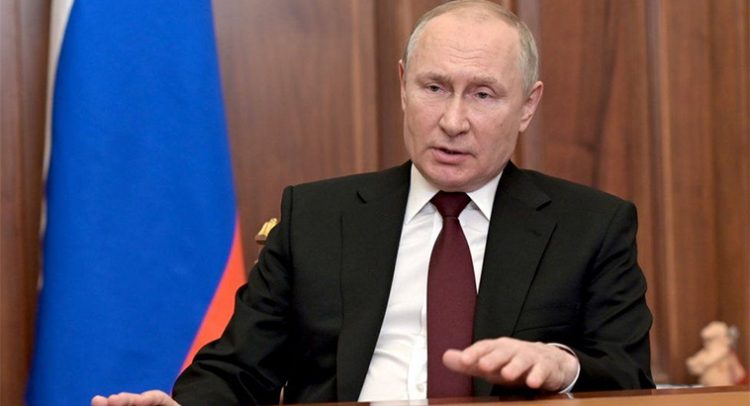Russia has vaulted past Iran and North Korea to become the world’s most-sanctioned nation in the span of just 10 days following President Vladimir Putin’s invasion of Ukraine.
In a surge of action led by the U.S. and European allies starting Feb. 22, Russia became the target of 2,778 new sanctions designations, bringing them to more than 5,530, according to Castellum.ai, a global sanctions-tracking database. That surpassed Iran, which has confronted 3,616 sanctions against it over the course of a decade, most for its nuclear program and support of terrorism.
The pressure on Russia has increased nearly every day. Over the weekend, American Express Co. and Netflix Inc. joined the growing list of companies withdrawing from or suspending operations in Russia. Some are doing so because of sanctions liabilities, but others are “self-sanctioning” — essentially deciding to get out even though they aren’t legally required to do so.
“This is financial nuclear war and the largest sanctions event in history,” said Peter Piatetsky, a former Treasury Department official in the Obama and Trump administrations who co-founded Castellum.ai. “Russia went from being part of the global economy to the single largest target of global sanctions and a financial pariah in less than two weeks.”
The sanctions against Russia underscore the extraordinary unity between the U.S. and its allies in the face of Putin’s invasion and their determination to leverage their economic power to try to dissuade him from pressing his advance. It also reflects the reluctance of those nations to put troops in harm’s way in Ukraine, a non-NATO ally.
Putin said over the weekend that the blitz of sanctions is “akin to a declaration of war.”
From Netflix to Samsung, the Exodus From Russia Becomes a Rout
After Russia and Iran, the list of most-sanctioned nations consists of Syria, North Korea, Venezuela, Myanmar and Cuba. The penalties include punishments against individuals, companies and even limits on yachts and airplanes.
Many of the U.S. sanctions against Russia before the Ukraine war were for interfering in the 2016 election and attacking political dissidents in Russia and abroad.
The vast majority of the sanctions against Russia since Feb. 22 are against individuals — 2,427, Castellum.ai says — compared with 343 against entities, which are usually companies or government agencies.
The nation leading penalties against Russia is Switzerland, with 568 sanctions actions, compared with 518 for the European Union and 512 for France. The U.S. has imposed 243 sanctions actions.
That data is also in keeping with what’s been one of the biggest surprises of the sanctions regimes so far: that European nations, historically more wary of imposing sanctions, have led the way, even surpassing the U.S. in some cases. Senior officials say one example of that was the decision to kick some Russian banks off the SWIFT financial messaging system, a move where the U.S. initially lagged.
There’s likely more to come given that Putin has so far been undeterred. On CNN’s “State of the Union” on Sunday, Secretary of State Antony Blinken said the U.S. and its partners are looking “in a coordinated way at the prospect of banning the import of Russian oil, while making sure that there is still an appropriate supply of oil on world markets.”
“It’s certainly the most historically significant sanctions campaign,” said Edward Fishman, who helped run the State Department’s sanctions office in the Obama administration. “With each new escalation in Moscow’s aggressive behavior you’ve had more and more people come to realize it’s going to be challenging to have productive relations with Russia so long as Putin is in power.”


